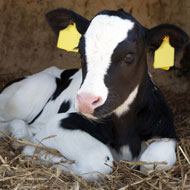Novel vaccine protects against RSV

The vaccine was used to immunise five calves aged three-to-six weeks, via two injections four weeks apart. (stock photo)
A novel vaccine has shown success in protecting cattle from respiratory syncytial virus (RSV) infection, and could offer hope for a human vaccine, researchers say.
RSV causes the majority of respiratory disease in cattle and is responsible for substantial economic loss. In humans, it causes serious bronchiolitis and pneumonia in young children, the elderly and people with compromised immune systems. There are estimated to be more than 250,000 human deaths a year as a result of RSV infection.
Currently there is no licensed vaccine for humans and cattle vaccines have noted issues with safety and effectiveness.
Research on the novel vaccine was conducted by a team of experts from the National Institute of Allergy and Infectious Diseases (NIAID) in the US, the Pirbright Institute in the UK and the Institute for Research in Biomedicine in Switzerland.
The vaccine was used to immunise five calves aged three-to-six weeks, via two injections four weeks apart. It contains a single, structurally engineered RSV protein, which is a stabilised version of the RSV fusion (F) glycoprotein it its initial conformation, pre-F. Other vaccines have used the same protein in its final conformation, post-F, but scientists say the immune response is much lower.
A second group of five calves were injected with a post-F protein, while the third group received two placebo injections of saline.
Four weeks later, calves in all three groups were infected with RSV. Of those injected with pre-F, four out of five were protected from RSV viral replication in the upper and lower respiratory tract and calves had high levels of neutralising antibodies - more than 100 fold higher than those given the post-F vaccine. However, RSV was detected in all calves given the post-F vaccine or the placebo.
Researchers say their findings, which were published in npj Vaccines, support further work on pre-F vaccines to protect humans and cattle from RSV. NIAID recently started testing a similar vaccine in a phase one human trial.



 The Animal and Plant Health Agency (APHA) has updated its online reporting service for dead wild birds.
The Animal and Plant Health Agency (APHA) has updated its online reporting service for dead wild birds.